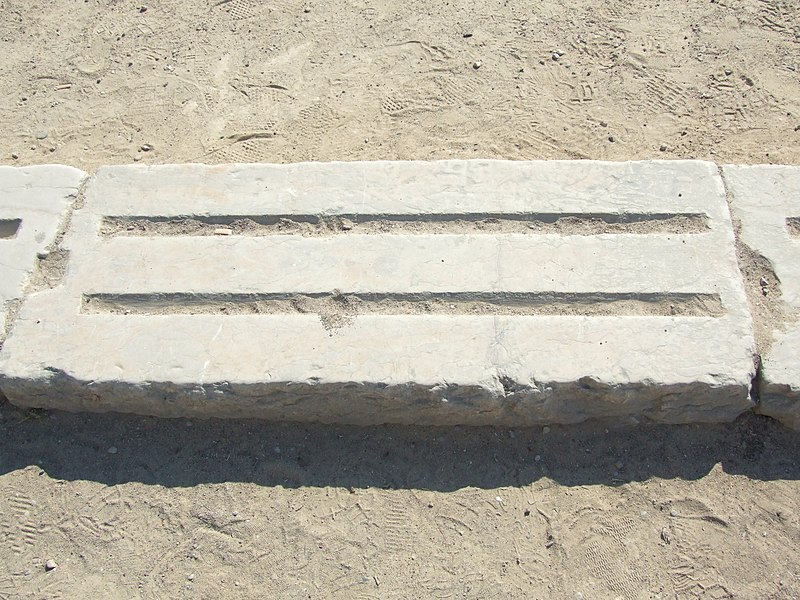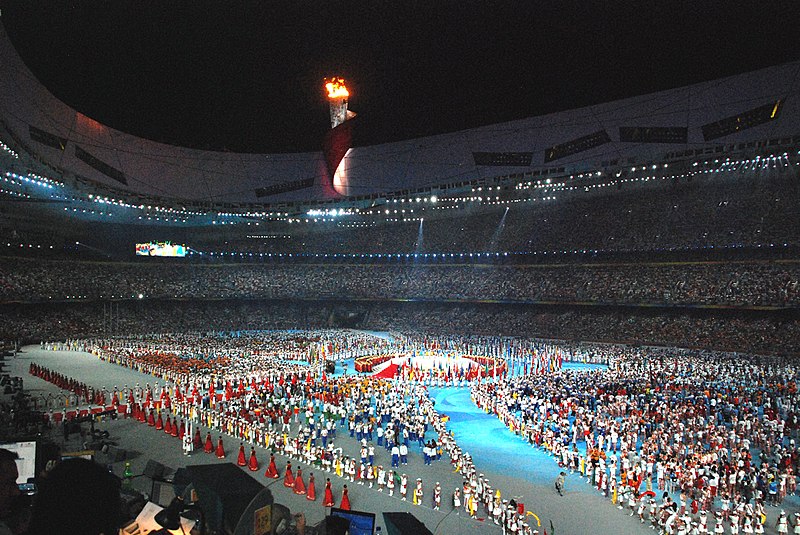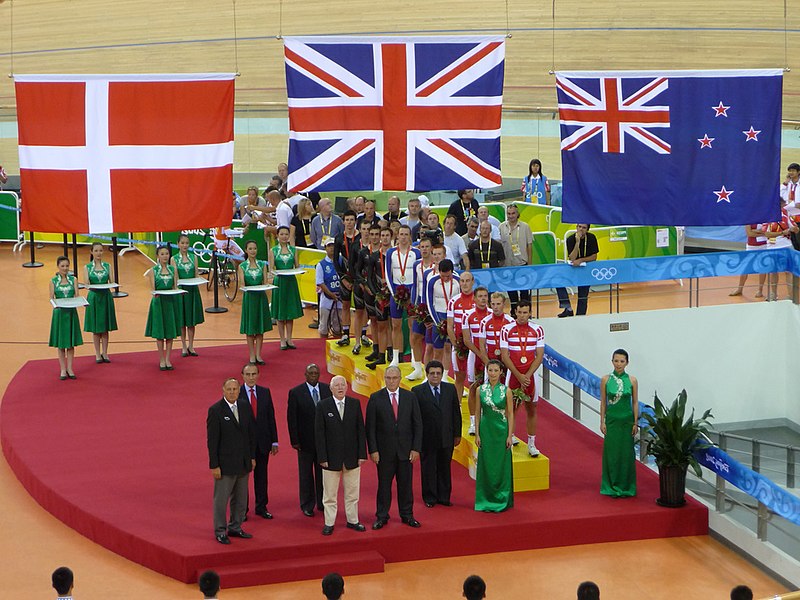The Olympic Games were a series of athletic competitions held for representatives of various city-states of Ancient Greece held in honor of Zeus. The exact origins of the Games are shrouded in myth and legend but records indicate that they began in 776 BC in Olympia in Greece. They were celebrated until 394 AD when they were suppressed by Theodosius I as part of the campaign to impose Christianity as a state religion. The Games were usually held every four years, or olympiad, as the unit of time came to be known. During a celebration of the Games, an Olympic Truce was enacted so that athletes could travel from their countries to the Games in safety. The prizes for the victors were wreaths of laurel leaves. The Games became a political tool used by city-states to assert dominance over their rivals. Politicians would announce political alliances at the Games, and in times of war, priests would offer sacrifices to the gods for victory.
The ancient Olympics were rather different from the modern Games. There were fewer events, and only free men who spoke Greek could compete (although a woman Bilistiche is also mentioned as a winner). As long as they met the entrance criteria, athletes from any country or city-state were allowed to participate. The Games were always held at Olympia rather than alternating to different locations as is the tradition with the modern Olympic Games. There is one major commonality between the ancient and modern Games, the victorious athletes are honoured, feted, and praised. Their deeds were heralded and chronicled so that future generations could appreciate their accomplishments.
To be in the Games, the athletes had to qualify and have their names written in the lists. It seems that only young people were allowed to participate, as the Greek writer Plutarch relates that one young man was rejected for seeming overmature, and only after his lover, who presumably vouched for his youth, interceded with the King of Sparta, was he permitted to participate. Before being able to participate, every participant had to take an oath in front of the statue of Zeus, saying that he had been in training for ten months.
At first, the Olympic Games lasted only one day, but eventually grew to five days. The Olympic Games originally contained one event: the stadion (or "stade") race, a short sprint measuring between 180 and 240 metres (590 and 790 ft), or the length of the stadium. The length of the race is uncertain, since tracks found at archeological sites, as well as literary evidence, provide conflicting measurements. Runners had to pass five stakes that divided the lanes: one stake at the start, another at the finish, and three stakes in between.
In the chariot racing event, it was not the rider, but the owner of the chariot and team who was considered to be the competitor, so one owner could win more than one of the top spots. The addition of events meant the festival grew from one day to five days, three of which were used for competition. The other two days were dedicated to religious rituals. On the final day, there was a banquet for all the participants, consisting of 100 oxen that had been sacrificed to Zeus on the first day.
The winner of an Olympic event was awarded an olive branch and often was received with much honour throughout Greece, especially in his home town, where he was often granted large sums of money (in Athens, 500 drachma, a small fortune) and prizes including vats of olive oil. Sculptors would create statues of Olympic victors, and poets would sing odes in their praise for money.
The athletes usually competed nude, not only as the weather was appropriate, but also as the festival was meant to celebrate, in part, the achievements of the human body. Olive oil was used by the competitors, not only as a substitute for soap for washing, bathing, and cleaning, but also as a natural cosmetic, to keep skin smooth, and provide an appealing look for the participants.
Modern Olympics
The Olympic Games is a major international event featuring summer and winter sports, in which thousands of athletes participate in a variety of competitions. The Olympic Games have come to be regarded as the world’s foremost sports competition where more than 200 nations participate. The Games are currently held every two years, with Summer and Winter Olympic Games alternating, although they occur every four years within their respective seasonal games.
The evolution of the Olympic Movement during the 20th and 21st centuries has resulted in several changes to the Olympic Games. Some of these adjustments include the creation of the Winter Games for ice and winter sports, the Paralympic Games for athletes with a physical disability, and the Youth Olympic Games for teenage athletes. The IOC has had to adapt to the varying economic, political, and technological realities of the 20th century. As a result, the Olympics shifted away from pure amateurism, as envisioned by Coubertin, to allow participation of professional athletes. The growing importance of themass media created the issue of corporate sponsorship and commercialization of the Games. World Wars led to the cancellation of the 1916, 1940, and 1944 Games. Large boycotts during the Cold War limited participation in the 1980 and 1984 Games.
The host city is responsible for organizing and funding a celebration of the Games consistent with the Olympic Charter. The Olympic program, consisting of the sports to be contested at the Games, is also determined by the IOC. The celebration of the Games encompasses many rituals and symbols, such as the Olympic flag and torch, as well as the opening and closing ceremonies. Over 13,000 athletes compete at the Summer and Winter Olympics in 33 different sports and nearly 400 events. The first, second, and third place finishers in each event receive Olympic medals: gold, silver, and bronze, respectively.
As mandated by the Olympic Charter, various elements frame the opening ceremony of the Olympic Games. Most of these rituals were established at the 1920 Summer Olympics in Antwerp. The ceremony typically starts with the hoisting of the host country's flag and a performance of its national anthem. The host nation then presents artistic displays of music, singing, dance, and theater representative of its culture. The artistic presentations have grown in scale and complexity as successive hosts attempt to provide a ceremony that outlasts its predecessor's in terms of memorability. The opening ceremony of the Beijing Games reportedly cost $100 million, with much of the cost incurred in the artistic segment.
After the artistic portion of the ceremony, the athletes parade into the stadium grouped by nation. Greece is traditionally the first nation to enter in order to honor the origins of the Olympics. Nations then enter the stadium alphabetically according to the host country's chosen language, with the host country's athletes being the last to enter. During the 2004 Summer Olympics, which was hosted in Athens, Greece, the Greek flag entered the stadium first, while the Greek delegation entered last. Speeches are given, formally opening the Games. Finally, the Olympic torch is brought into the stadium and passed on until it reaches the final torch carrier—often a well-known and successful Olympic athlete from the host nation—who lights the Olympic flame in the stadium's cauldron.
The closing ceremony of the Olympic Games takes place after all sporting events have concluded. Flag-bearers from each participating country enter the stadium, followed by the athletes who enter together, without any national distinction. Three national flags are hoisted while the corresponding national anthems are played: the flag of Greece, to honor the birthplace of the Olympic Games; the flag of the current host country, and the flag of the country hosting the next Summer or Winter Olympic Games. The president of the organizing committee and the IOC president make their closing speeches, the Games are officially closed, and the Olympic flame is extinguished. In what is known as the Antwerp Ceremony, the mayor of the city that organized the Games transfers a special Olympic flag to the president of the IOC, who then passes it on to the mayor of the city hosting the next Olympic Games. After these compulsory elements, the next host nation briefly introduces itself with artistic displays of dance and theater representative of its culture.
A medal ceremony is held after each Olympic event is concluded. The winner, second and third-place competitors or teams stand on top of a three-tiered rostrum to be awarded their respective medals. After the medals are given out by an IOC member, the national flags of the three medalists are raised while the national anthem of the gold medalist's country plays. Volunteering citizens of the host country also act as hosts during the medal ceremonies, as they aid the officials who present the medals and act as flag-bearers. For every Olympic event, the respective medal ceremony is held, at most, one day after the event's final. For the men's marathon, the competition is usually held early in the morning on the last day of Olympic competition and its medal ceremony is then held in the evening during the closing ceremony.
London 2012
The 2012 Summer Olympic Games, officially the Games of the XXX Olympiad, are scheduled to take place in London from 27 July to 12 August 2012.
Following a bid headed by former Olympic champion Sebastian Coe and the then Mayor of London Ken Livingstone, London was selected as the host city on 6 July 2005 during the 117th IOC Session in Singapore, defeating Moscow, New York City, Madrid andParis. London will become the first city to officially host the modern Olympic Games three times, having previously done so in1908 and in 1948.
While budgetary considerations for the games have generated some criticism, they have also been welcomed by others as having prompted a redevelopment of many of the areas of London in which events are to be held – particularly themed towards sustainability. The main focus of the games will be a new 200 hectare Olympic Park, constructed on a former industrial site at Stratford in the east of London. The Games also make use of many venues which were already in place before the bid.
There have been two London 2012 logos: one for the bidding process created by Kino Design and a second as the brand for the Games themselves. The former is a ribbon with blue, yellow, black, green, and red stripes winding through the text "LONDON 2012," making the shape of the River Thames in East London. The latter, designed by Wolff Olins, was unveiled on 4 June 2007 and cost £400,000. This new logo is a representation of the number 2012, with the Olympic Rings embedded within the zero.
The Olympic Flame, Torch and Relay draw on a history going back to the ancient Olympic Games in Greece. The Torch and Relay were important elements of the cultural festivals surrounding the Olympic Games of Ancient Greece. During the Games, a sacred flame burned continually on the altar of the goddess, Hera. In addition, heralds were summoned to travel throughout Greece to announce the Games, declaring a sacred truce for the duration. A very precise ritual for the lighting of the Flame is followed at every Games. It is lit from the sun's rays at the Temple of Hera in Olympia, in a traditional ceremony among the ruins of the home of the ancient Games. After a short relay around Greece, the Flame is handed over to the new Host City at another ceremony in the Panathenaiko stadium in Athens.
The Torch was designed by east Londoners Edward Barber and Jay Osgerby, who won the opportunity through a competitive tender run by the London 2012 Organising Committee and the Design Council. Basildon-based product engineers Tecosim, Birmingham-based LPG Gas specialists and manufacturers, Bullfinch and Coventry manufacturers Premier Sheet Metal have taken the design and moved it into mass production. In April 2012 the Torch was recognised as the Design of the Year at an awards ceremony hosted by the Design Museum.
The Torch is made up of an inner and an outer aluminium alloy skin, held in place by a cast top piece and base, perforated by 8,000 circles. Representing the inspirational stories of the 8,000 Torchbearers who will carry the Olympic Flame, the circles which run the length of the body of the Torch also offer a unique level of transparency. You can see right to the heart of the Torch and view the burner system which will keep the Olympic Flame alive on its journey around the UK. The circles also help ensure heat is quickly dissipated, without being conducted down the handle, and providing extra grip. The Torch stands 800mm high.
The triangular-shaped Torch was inspired by a series of 'threes' that are found in the history of the Olympic Games and the vision for the Olympic Movement.
From securing the land to build the Olympic Park after the bid was won in 2005, to completing the majority of construction in 2011, a remarkable transformation has taken place in east London, the heart of the London 2012 Games. This area of untapped potential has been developed into a spectacular urban park with world-class venues and new infrastructure links – and the potential for further regeneration for decades to come.
The Olympic Delivery Authority, established in 2006, was responsible for building the main permanent venues and infrastructure on the Olympic Park, and the Olympic Village. It also built the new Lee Valley White Water Centre and made enhancments to the existing venues at Eton Dorney and Weymouth and Portland.
Throughout the construction programme and planning the Games themselves, we have been thinking of tomorrow: our aim is for the Games to leave an amazing legacy – for the Games to be remembered not only as a summer of fantastic sport, but as the catalyst for the regeneration of one of the most underdeveloped areas of the UK.
In building the venues and staging the Games we have ‘raised the bar’ for both the construction industry and future large-scale events. In areas as diverse assustainability, health and safety, equality and inclusion, and business, jobs and trainingwe have set new standards to which others can now aspire.








No comments:
Post a Comment